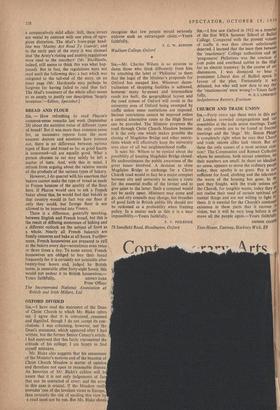BREAD AND FLOUR SIR, How refreshing to read Pharos's common-sense
remarks last week (September 28) about the nutritive value of different types of bread! But it was more than common sense for, as successive reports from the most eminent doctors and scientists have pointed out, there is no difference between various types of flour and bread so far as good health is concerned—all are equally good. What a person chooses to cat may safely be left a matter of taste. And, with this in mind, I refrain from arguing about the relative merits of the products of the various types of bakery.
However, I do quarrel with his assertion that bakers cannot make the type of bread as made in France because of the quality of the flour here. If Pharos would care to ask a French baker about this, he would find that bakers in that country would in fact buy our flour if only they could, but foreign flour is not allowed to be imported into France.
There is a difference, generally speaking, between English and French bread, but this is the result of differing economics of baking and a different outlook on the subject of food as a whole. Nearly all French bakeries, are family concerns and bake at all hours. Further- more, French housewives are prepared to call at the bakers every day—sometimes even twice, or three times a day. To some extent, French housewives are obliged to buy their bread frequently for it is certainly not palatable after twenty-four hours and, judged by British tastes, is uneatable after forty-eight hours; this would not endear it to British housewives.—
Yours faithfully, SIDNEY DARK Press Officer The Incorporated National Association of British and Irish Millers, Ltd.


































 Previous page
Previous page